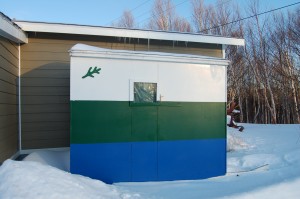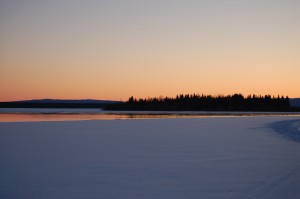Am I For Real? Academic authenticity and the future of anthropology
Posted in anthropology on September 12th, 2011 by Emily S. Channell-Justiceby Emily S. Channell and Kara Newhouse
Last week, I did an interview with my anthropology life partner, Kara Newhouse, on the future of anthropology. I’ve decided to share it here in full, and you can read the original post at Rogue Anthropologist.
Last week an anonymous person using a fake email address left a comment on one of my posts declaring that an undergraduate degree does not make me an anthropologist. In fact, I agree. A degree (bachelor’s or graduate) doesn’t necessarily mean a person will adopt and utilize anthropological perspectives. Rather, it is my ability to employ critical thinking about culture, socialization, power, and human relationships in my life and work that makes me an anthropologist.
Nevertheless, the comment did bother me. I am open to discussion and debate but not with people who leave derogatory comments anonymously. (Leaving a fake email means that the person wouldn’t receive notifications of any follow-up comments.) I find that to be as petty, offensive, and unproductive as the jerks who shout out truck or car windows at bicyclists just for the thrill of scaring them.
But rather than dwell on that negativity and waste my time defending my authenticity to an audience who likely agrees that education is about what you actually learn not the letters after your name, I decided to have a more positive conversation with my dear friend/anthropology life partner, Emily Channell, about the relevance of anthropology as well as its future. Emily is a PhD candidate at City University of New York, where she also teaches undergraduate anthropology courses.
KN: In our initial discussion about the comment on my blog, you noted that anthropology is seen as a dying discipline and said, “If we reject all the various forms of anthropologists, then we condemn anthropology to death.”
Why is anthropology considered a dying field, and what non-academic forms of anthropology do you find exciting?
EC: The question of whether or not anthropology is a dying field has been through a lot of debate. If we think of anthropology as the study of “culture,” then I think we can see both how it might stagnate and also the potential for non-academic forms of anthropology. If it remains exclusively for academia, then eventually anthropologists will run out of places to go, people to study, and things to say. But it also has an incredible ability to change over time.
I think kinship is a great way to look at the way anthropology can change. People studied kinship since the 19th century, then in the second part of the 20th century people considered it dead until David Schneider studied American kinship in 1968 (somehow no one had really thought of doing that before) and then critiqued the whole idea of kinship in 1984. And now kinship has been revisited over and over again to make it still relevant.
So anthropology has this amazing ability to reinvent itself. But, most of the time that reinvention remains in the ivory tower. This means that the image the public typically has of anthropologists is still that of Margaret Mead or Bronislaw Malinowski, even though our ideas are significantly different than theirs. I think anthropology is a dying field because it insists on being so bounded and remaining within academia—as if people on the streets can’t understand culture!
So the non-academic forms of anthropology that I find exciting are the ones that challenge any understanding of “culture” that anthropologists might have. It’s the way that any person can become an anthropologist if they look at the world with a critical eye. You don’t have to be able to draw a genealogy to do that—but you can understand that being “related” often more frequently means relying on someone when you need them, even if society doesn’t consider them your “kin,” for example.
KN: Hmm, so perhaps anthropologists a hundred years ago wouldn’t have considered David Schneider’s kinship studies legitimate?
EC: No, because they didn’t see studying the U.S.—except for Native Americans—as anthropology. Anthropologists then only wanted to study the “other,” the “exotic.” Studying the developed/urban/industrialized U.S. was the domain of sociology. Which leads to the point that only when anthropology and sociology stopped thinking of each other as mutually exclusive did studying the U.S. as an anthropologist become legitimate. And this led to very different conclusions than sociologists ever made.
KN: Trying to say what a field of study is and isn’t is so limiting! What do you think recent technology developments (video, blogging, etc.) have brought to anthropology? Besides new human behaviors to study of course.
EC: I think blogging is great! For me, it gives me a forum to have fulfilling and inspiring conversations with people—both academically trained and not!—in a way that I can’t do in an academic setting. It’s not to say that academic conversations are bad, but they can be frustrating because there’s always a sense of competition, even with your best friend, because you’re all trying to get the same publications and mentors and tenure. With blogging, you get a broader spectrum of opinion without the same focus on name-dropping and jargon.
As far as video technology, anthropology has relied on that for a long time, but as with other parts of the discipline, the significance of it has changed a lot. For people like Mead and Malinowski, it was another way of proving “they were there,” which was the basis for the authority of anthropology for a long time. Now I feel like people use visuals like video and photo to delve into another realm of anthropology. It’s yet another way we use our senses to critique the world around us, which I think is really integral to the continued relevance of anthropology.
KN: Good point about the long-time use of video and how it’s changed. What do you mean when you say people today use visuals to “delve into another realm of anthropology”?
EC: Previously film and video was used to prove authority and also the “exoticness” of people. Now that anthropologists have recognized the problems associated with that kind of voyeurism, photography and video have to be used as critique. So for example, in an ethnography about Native Alaskans, a picture of a “totem poll” and “cabin” aren’t used to show primitive dwellings—it’s a photo that shows state-sponsored “nativism” as tourist attraction because the house was built in the 1990s in a place where Native Alaskans don’t even live. So photos are used to enhance the arguments made by texts. It’s still used as another kind of proof, but proof of critique rather than strangeness.
KN: You noted that writing your blog gives you chances to have different conversations from the ones you have in class—are there ways that things your read from other blogs (anthropologists or otherwise) influence how you think about anthropology in the academic setting?
EC: I wish I could answer yes to that question, but if I’m honest then not really. Reading other blogs does two things for me.
The first is that it makes me think about my work in different ways, but these ways are often at odds with what academic anthropology thinks I should be doing. For academic anthropology, my ideas are my own until I publish them in a book or maybe share them in a small forum of other like-minded people. Putting my precious ideas on the internet for everyone to see is completely counter to the really possessive nature of academics. And I don’t really feel comfortable in classroom settings bringing up blogging or the conversations started there because you’ll inevitably get into a debate about whether blogging counts as anything at all. The academics who consider blogs anywhere near legitimate are very few and far between.
The second thing reading blogs does is just make me mad that academics have this attitude of superiority—that no matter how many blogs I write that are well-received or start great conversations, they are never going to “count” in the way publishing does. So it can be frustrating to get too excited about blogs sometimes, because for academic anthropology I think it’s a dead end. For anthropology in general, though, I think blogs are playing a significant role in keeping the discipline vibrant.
KN: That’s sort of depressing, but your distinction between academic anthropology and anthropology in general is really important, and that’s the part that’s optimistic! Can you elaborate more on the importance of an anthropology that isn’t limited to the academy?
EC: I always see anthropology as the study of the world around us — but the “around us” part doesn’t have to mean around the high-ranking institution.
Anthropologists are one set of people who are critical of inequalities. But even as we recognize that the U.S. doesn’t have equal access to education, we keep anthropology for ourselves, making it exclusive to those who have the means to access it. To me, this runs counter to the fundamental motivations of doing anthropology, and this is what has the potential to kill the discipline. If anthropology remains in the hands of those who are most powerful now — which, let’s face it, are white men, with a few women and people of color thrown in for equality’s sake—then it will become stagnant.
But opening the idea of anthropology to be something that anyone can use and do not only makes the discipline relevant, but it keeps it constantly shifting, changing, dynamic—all words anthropologists have used to describe culture, people, and history. I think we need to apply our own ideas to our discipline—we can absolutely believe that anthropology has its own epistemology, but that epistemology tells us that there isn’t one right way to think about the world. So letting more people “be” anthropologists is just one way to keep the discipline going, and going down an interesting path.
KN: Hell yeah! I sometimes forget that our undergrad training was uniquely rooted in the perspective that anthropology can and should be used to address the inequalities we study. I’m really grateful that we had professors who support and fight for that.
EC: Me too—they are a lot more difficult to find than I realized.
KN: Now that you’re a professor, what are some examples you like to share when talking about public anthropology with students?
EC: Well, mostly I start with trying to relate what anthropologists write about with their daily lives. I always try to focus at least partly on the U.S.—exotic examples can be fun, but only if students also make the connection between those “weird” people and the people they see every day. I try to recommend using an anthropological lens to look at problems they see with the world, to look at the structure that creates inequalities rather than just making generalizations about this type of person or that type of person.
As far as translating that into action, this is a dilemma I feel like all students right now are facing. They can see the uses of anthropological critiques, but where do they—and we—go from there? I think anthropologists of all shapes and sizes need to work on answering that question together, because not having a direction to apply what we learn can also really threaten the discipline.
KN: Yeah, I see what you mean about the dilemma students face over how to use their critical thinking skills. I like to tell the story of how when people asked what I would do with my anthro degree I’d respond “whatever I want!” Which was partly me being feisty but also partly that same crisis of not really knowing.
Now, two years later, I have followed that idea and found my anthropology training highly important to being a reflective journalist and teacher, but my younger self probably would’ve benefited from hearing from someone like me who still identifies as an anthropologist but isn’t in academia (or working at an international development agency, *shudder*).
In other words, attention public anthropology professors, I’m totally willing to be a guest speaker in your class!
EC: Haha, I really like what you say, though, and that it’s feisty. That’s a huge reason I want to do anthropology. I love teaching and research, but I can teach and research anything I want! And that’s amazing! That’s the greatest thing about anthropology.
But the biggest lack is the detachment between “academic” and “applied” jobs, the latter of which tend to just be development organizations or NGOs, like you say. And that can be really limiting to people who think through anthropology but don’t want to remain in the academy—they don’t get much respect from academics, so they’re resigned to a minimal variation in jobs they can actually use anthropology for. We need to make that change.
KN: Amen/women! Maybe we should write a paper about it. …Just kidding!
EC: It’s funny you say that, because it’s so often the go-to answer for academics. Think outside that box!!
KN: Maybe I should start interviewing folks who studied anthropology and are doing other things and compile the responses here on my blog…
EC: That’s an interesting idea.
KN: Yeah, I think I would’ve appreciated it as a student.
EC: Doubts about anthropology are so often about relevance, and people in academic anthropology need to think about that or they will be really marginalized, no matter how smart and prolific they are.
KN: Powerful. Any other final thoughts or issues to address?
EC: Just that I think it’s a collective task—no one anthropologist is going to revitalize the discipline and bridge all the gaps that exist. We have to recognize the situation and think about how to make positive change together. And that future has the potential to be really, really bright!
KN: I agree. My rogue side has a tendency to strike out as an individual, but that doesn’t mean I’m not thrilled when I find others who are trying to accomplish the same goals…with our powers combined, and all that Captain Planet jazz.
EC: Yeah! And I think there are a lot of us who have the same goals.
KN: Here’s hoping that some of the others chime in on this discussion—and continue it in their corner of the world.




